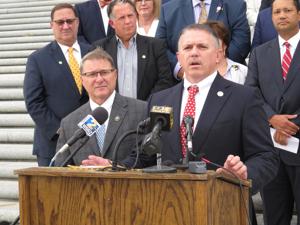Legislative leaders put unified sales tax collection for Louisiana at top of agenda

(The Center Square) – Days after announcing their intention to “fundamentally change” the state’s tax structure, the Louisiana Legislature’s top two elected leaders said centralizing the state’s tax collections is their biggest goal for the upcoming legislative session.
“That’s our big ask this year,” House Speaker Clay Schexnayder said.
Schexnayder joined Senate President Page Cortez on a podcast hosted by the Louisiana Association of Business and Industry. Cortez said he and Schexnayder might be the first speaker and Senate president in recent history chosen in independent elections the governor didn’t control.
With independence, however, comes additional responsibility, Cortez said.
“We now have to come up with a plan,” he said. “The governor, to his credit, has given us this latitude to say, ‘OK, go tell me what your agenda is, policy-makers.’ So now it’s our turn.”
Sales tax collection in Louisiana is highly decentralized. Business advocates say the system is difficult to navigate, especially for small firms, and discourages companies from locating or expanding in the state.
“Each parish in Louisiana oversees its own sales tax collection, audits, rates and even interpretations of what is taxed,” the Public Affairs Research Council of Louisiana said in a 2018 report. “No other state has this degree of local independence and control of its sales tax system.”
Local government officials, however, traditionally have been wary of creating a unified state collector, arguing that local control is the best way to ensure the money is spent according to the wishes of local taxpayers and voters. Louisiana also has an unusually large number of exemptions and exclusions, some of which apply only at the state or local level, which also adds complexity a single collector won’t fix.
A task force the Legislature created endorsed the single-collector concept but didn’t come to an agreement about how the collector should be governed and how audits would work. Local governments don’t want to give up their right to audit taxpayers, but business owners don’t want to deal with multiple audits.
The question of whether legislators should centralize collections goes back at least two decades, Cortez said. The change would require a state constitutional amendment, meaning it would need the approval of at least two-thirds of the legislators in each chamber and a majority of voters.
Lawmakers also will discuss eliminating the state’s income tax deduction for federal taxes while lowering the income tax rate so the overall tax burden is about the same. Voters in most parishes legalized sports betting in their jurisdictions last year, so the Legislature this year will try to work out the rules and tax structure.
Another major unresolved issue for this year that isn’t tied to the upcoming legislative session is redistricting. Legislators need an official population count to redraw political districts, but the U.S. Census results, which were supposed to be ready by the end of last year, now may not be available until the end of September.
Cortez said lawmakers want to make sure local voters have a chance to weigh in, so the Legislature may not be able to hold a redistricting session until February. Lawmakers don’t have to complete the whole process in a single session, and the priority would be Congress, which holds elections next year, he said.
Louisiana holds elections for state offices in 2023.
This year’s regular legislative session begins April 12 and must end by 6 p.m. June 10.
Disclaimer: This content is distributed by The Center Square
